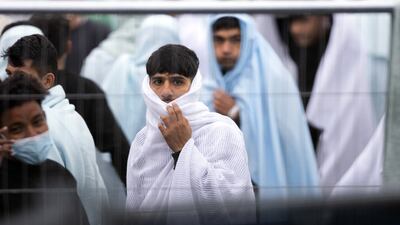A British government official says people who enter the country illegally have “a bit of a cheek” to complain about conditions.
Minister of State for Policing Chris Philp made the comments during the growing crisis in the UK asylum system, in which processing centres are struggling to cope.
Earlier this week, asylum seekers who were being housed at the overcrowded Manston facility were left at London’s Victoria coach station without accommodation on two separate occasions, according to reports.
A 13 year-old boy was allegedly assaulted by a man in his 30s while staying at a hotel housing refugees.
Mr Philp told Times Radio: “If people choose to enter a country illegally, and unnecessarily, it is a bit, you know, it’s a bit of a cheek to then start complaining about the conditions when you’ve illegally entered a country without necessity … they don’t even have to come here, they were in France already and previously often passed through Belgium, Germany, and many other countries on the way.
“So, we’re doing our best, but the numbers are just overwhelming.
“That’s why we need to do more work with the French government to stop these crossings. And also look at reforming the way that some of these international treaties are getting applied domestically, because it is making it very hard, or basically impossible, to properly police our borders.”
Mr Philp said that the UK is a “generous country” in accommodating asylum seekers.
“We’re spending something like £2 billion [$2.24bn] or £3 billion pounds a year looking after people who have entered the country illegally and unnecessarily. I think, frankly, that is pretty generous, actually … our asylum accommodation is better than most European countries.
“In terms of people who are genuinely in need of protection, we are a generous country … this is a very generous country that looks after people in genuine need.”
Conditions at the site at Manston in Kent were last week described by Independent Chief Inspector of Borders and Immigration David Neal as “pretty wretched”.
Numbers have swelled with an influx of new arrivals, with one Afghan family telling Mr Neal they had been there for 32 days.
The centre is designed to hold people for a maximum of 24 hours.
An HM Inspectorate of Prisons inspection this summer found some migrants were not allowed access to mobile phones to let their families know they were safe, and “in some parts of the site they were, inexplicably, not even allowed to close toilet doors fully”.
Migrants at immigration processing centre in Manston - in pictures



Chief Inspector of Prisons Charlie Taylor said the government “had to get a grip”.
“I returned in September to have another look and already we were beginning to see some of those risks we had flagged in the summer manifest themselves,” Mr Taylor told Sky News.
“So people were starting to spend longer on site. People were unable to make contact with family. People were staying in accommodation that wasn’t good enough.
"What we are now hearing is that things are becoming much worse — that people are spending much longer periods of time at the centre.”
Home Secretary Suella Braverman toured immigration centres in southern England, including Manston, on Thursday as she attempts to control the crisis in the UK asylum system.
She also met Border Force teams in Dover, the port town where many migrants arrive on small boats.
The government blames the crisis on a surge of migrants making the journey across the Channel from France.
Provisional government figures show that at least 5,000 migrants made the crossing in October.
Prime Minister Rishi Sunak is reportedly seeking a new cross-Channel deal with France to include targets for how many boats are stopped from reaching the UK to prevent the UK asylum system collapsing, according to reports.
More than 38,400 migrants have arrived in the UK after crossing the Channel so far this year, according to provisional government figures, compared with about 28,500 in 2021.
The government says many of them are single Albanian men. From May to September, Albanians represented about 42 per cent of those attempting small boat crossings.
There are currently more than 100,000 asylum claims waiting to be decided.


